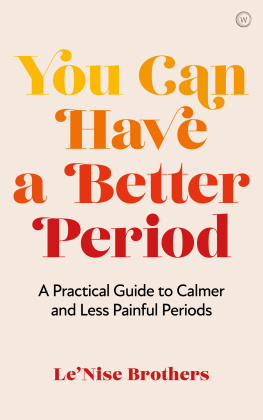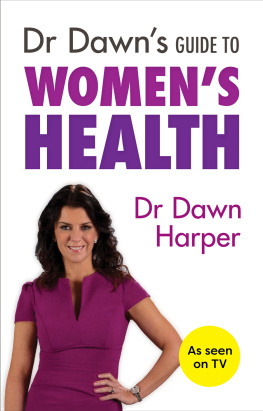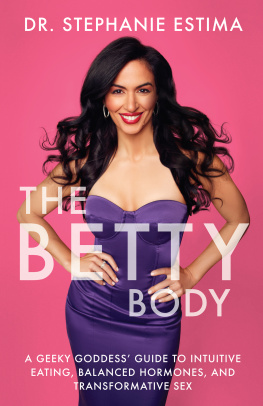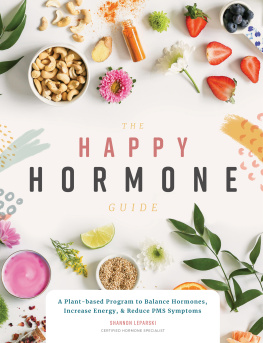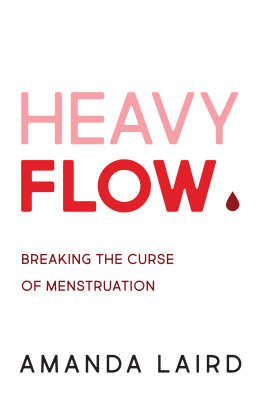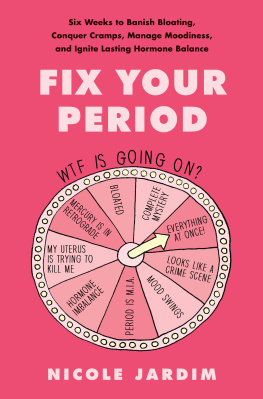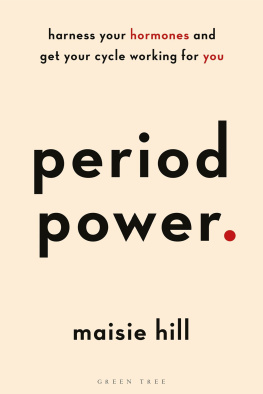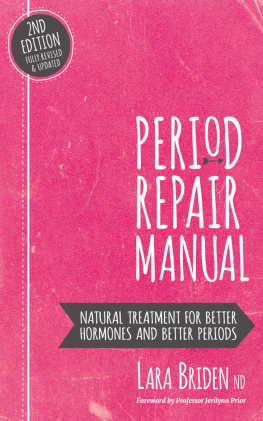

To Mummy,
Heres the book I wish you had.
You Can Have a Better Period
LeNise Brothers
First published in the UK and USA in 2022 by
Watkins, an imprint of Watkins Media Limited
Unit 11, Shepperton House, 8393 Shepperton Road
London N1 3DF
Design and typography copyright Watkins Media Limited 2022
Text copyright LeNise Brothers 2022
Photography copyright of author photo Patricia McHugh 2022
The right of LeNise Brothers to be identified as the Author of this text has been asserted in accordance with the Copyright, Designs and Patents Act of 1988.
All rights reserved. No part of this book may be reproduced in any form or by any electronic or mechanical means, including information storage and retrieval systems, without permission in writing from the publisher, except by a reviewer who may quote brief passages in a review.
Commissioning Editor: Anya Hayes
Assistant Editor: Brittany Willis
Head of Design: Karen Smith
Designer: Steve Williamson
Illustrator: Sneha Alexander
Production: Uzma Taj
A CIP record for this book is available from the British Library
ISBN: 978-1-78678-560-2
10 9 8 7 6 5 4 3 2 1
Printed in United Kingdom by TJ Books
www.watkinspublishing.com
Contents
Introduction
We all have that one friend. Her periods come like clockwork every month, with no pain and no drama. She gets on with her life and her period comes along on the ride with her. I used to think this woman had won the health lottery she was one of the lucky ones.
You can be one of these women. You can have a period that is pain- and drama-free. You can have a menstrual cycle that syncs with the rest of your life. I promise you this isnt a fantasy!
According to the NHS, the average woman has two to three days of pain either right before her period or when she has her period. Thats the equivalent of between 24 and 36 days of pain each year! If this was any other condition, its hard to believe that we would allow this to persist. Unfortunately, the inevitability of period pain has been normalized in our culture by the way periods and menstrual health are discussed in films, magazines and on TV (usually as a huge inconvenience or trauma), by the stories that are passed on by those in our lives who have periods and, for many of us, how our mothers and sisters experienced their periods.
We now have the opportunity to change this narrative and change the way we experience and talk about our periods. Pain is a sign from our bodies that something isnt right. Its an opportunity to ask questions and dig deeper, rather than simply accepting this as part of your experience of having a period. Asking questions helps empower us to better navigate our bodies and our health.
I know so many of us have been told that its normal to have painful periods, normal to feel like your hormones are running the show, normal to be an emotional mess before your period. Im here to tell you that it doesnt have to be this way. This book is your guide to having a better period and understanding your menstrual cycle.
My Story
When I first thought about the book I wanted to write about periods, hormones and menstrual health, I pictured the book I wished Id had to guide me when I was at the worst of my period problems.
My period started when I was 13. I was a late bloomer in so many ways, including being the last of my friends to get my period. When it arrived, it felt like a big moment. I was finally transitioning into the next part of my life! And it was indeed a big moment. That first period ushered in years of pain, physical and emotional distress and the start of the ongoing fight I still have with my body.
My very first period was strange because I had been waiting for it for so long. When it finally came, I was really disorientated. This new thing had moved all of my anchor points and I needed to figure out how to navigate my body in a different way.
I remember being in the bathroom, seeing the blood in the toilet and calling out to my family in the living room to say that something had happened. To which my father said, Oh, did you get your period? to which I replied, Yeah, I think I did.
It was from that point onward that my body began to feel like such an unwieldy mystery to me. I started to get boobs, hips and a butt. My clothes fitted differently. I felt more and more awkward. And every month, I had to figure out how to get through this incredibly dramatic event that seemed to be affecting only me so badly. From the outside, my friends looked like they didnt have a care in the world when it came to their periods.
Dont get me wrong, I did have carefree teenage moments. I would have about three weeks when my life seemed completely normal. I could function like a normal teenager: going to school, hanging out with my friends, reading, listening to music, playing sport and having massive crushes on boys. Then I would feel the whispers of my period coming and Id know that all hell was about to break loose. The fury and the tears would begin, then five days of terrible cramps, headaches and intensely heavy bleeding.
My attitude toward my period transformed from something I was really looking forward to into a monthly source of dread. From the very beginning, I had terribly painful and heavy periods that left me lying on the bathroom floor writhing in pain and missing days of school. The only things that seemed to resolve it were hot baths that I would sit in for hours, strong painkillers and sleep. You may be wondering: where was my mother while all this was happening?
She was trying to cope with her own period problems. For years, she had periods that seemed endless, sometimes lasting for a month at a time. She told me much later that she didnt know how she got through them, but she thought it was normal. Eventually, she was diagnosed with fibroids (non-cancerous growths on, in and within the muscular walls of the uterus) and had two removed that were the size of grapefruits. These two fibroids caused years of heavy, month-long periods that left her drained and struggling to cope. Seeing what my mother was going through made me think that having problematic periods was just a part of being a woman, something you just had to cope with.
I think back to a particular moment when I was 15 years old, laid out on my bathroom floor in agony from period pain. This was a particular type of pain that felt as though it was stabbing me all over my stomach and legs. I missed school that day and did what became a habit: running and rerunning hot baths that I would sit in for hours to try and soothe the pain. Eventually, I told my mother about my painful and heavy periods. It took some convincing (the distrust of allopathic medicine runs deep in my family!), but in time, she took me to the doctor, who told me what was happening to me was just part of having a period. She gave me a prescription for Naproxen (a strong painkiller) and birth control pills and sent me on my way.
Those pills dealt with the pain, but they did nothing for the heavy bleeding and blood clots, so I became an expert in using a combination of pads, rolled-up toilet paper and tampons to manage the flow. I cant tell you the number of underwear and trousers I bled through.
I soldiered on because I believed what the doctor told me and what I saw happening to my mother: that this was just part of being a woman. It was my lot to have painful, heavy periods, wear double pads and feel lousy for one week of every month.
Next page
